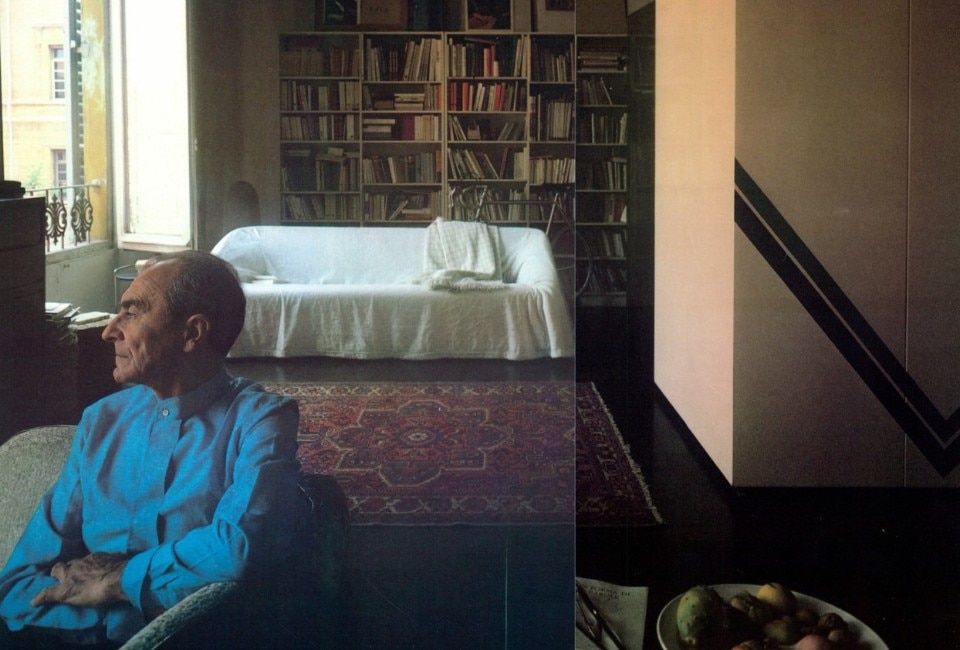The presence of a large number of design icons in our homes is often due to figures linking reflection and practice, figures that are anything but secondary: Dino Gavina and his Bologna-based company were the spark of production for Marcel Breuer’s Bauhaus chairs, as well as for the world-famous pieces by Le Corbusier and Perriand, or one of the most disruptive debut pieces in the history of design manufacturing, such as Achille and Pier Giacomo Castiglioni’s Sanluca armchair. A man of ideas and ramified relationships, founder first of Gavina Spa, with Carlo Scarpa as a chairman – and author of a showroom that is now a highlight of all art walks in Bologna – then of Flos, Gavina welcomed Domus at his home when the directorship was entrusted to another great art director, as well as designer and critic: Alessandro Mendini, who in those very years was bringing revolutions to Alessi that would mark an era. Without any magniloquence or celebratory ambition, these are the ‘warehouse of useful objects’, the ‘house in the house’, and the world of design that Gavina told Domus about in September 1982, on issue 631.
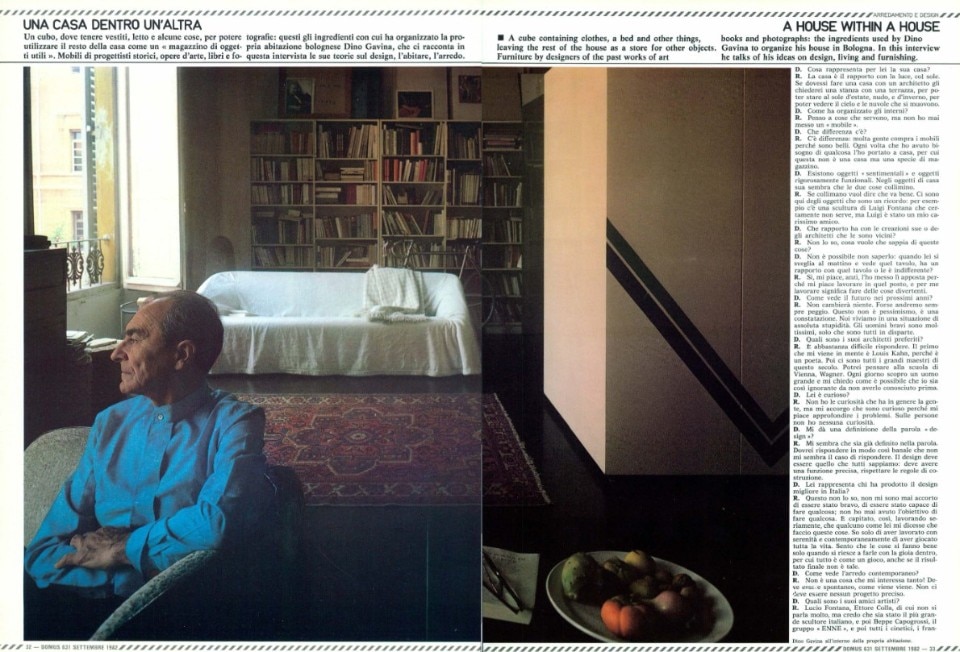
A house within a house
A cube containing clothes, a bed and other things, leaving the rest of the house as a store for other objects. Furniture by designers of the past works of art books and photographs: the ingredients used by Dino Gavina to organize his house in Bologna. In this interview he talks of his ideas on design, living and furnishing.
What does your house mean to you?
Dino Gavina: A house is a relationship with light and sun. If I built a house with an architect, I would ask him to provide a room with a large balcony where I could lie naked in the sun in summer and where, in winter, I could watch the sky and moving clouds.
How have you organized the interiors?
I’ve never inserted any “piece of furniture” as such.
What difference is there between useful things and furniture?
There is a difference: a lot of people buy furniture because it’s beautiful. In my case, whenever I’ve needed something I’ve brought it home: that’s why it’s not so much a home as a kind of store.
We can distinguish between “sentimental” objects and those that are strictly functional. But in your house the two things coincide.
If they coincide it means that they’re all right. I do have some objects here that are memories for me: for example, there’s a Luigi Fontana sculpture that certainly has no function, but he was a very dear friend of mine.
What relationship do you have with the works by yourself and architects close to you?
I don't know, what do you think I should feel about them?
It’s impossible not to feel something about them: when you wake up in the morning and see that table, do you have a relationship with it or are you indifferent?
Yes, I like it, in fact, I put it there on purpose because I like working there, and for me working means doing things that are fun.
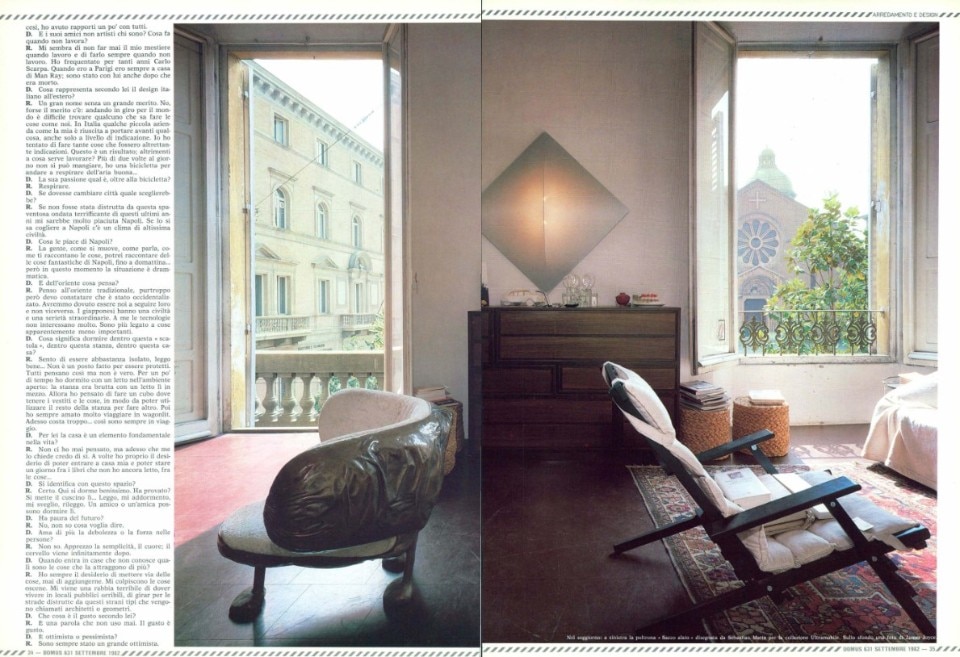
How do you see the future of design in the next few years?
No change. Perhaps it’ll get worse. This isn’t pessimism, just an affirmation. The situation today is completely stupid. There are lots of good people, but the’re not the people in the centre of things.
Who are your favourite architects?
That’s quite a difficult one. The first who springs to mind is Louis Kahn, because he’s a poet. Then there are all the great masters of this century. I could mention the Vienna school, Wagner. Every day I discover a great man and I wonder how I could be so ignorant as to have not known about him before.
Are you a curious person?
I don’t have the curiosity that people generally have, but I realize that I’m curious because I like to go into problems. I’m not curious about people at all.
Can you give me a definition of the word “design”?
It seems to me the word defines itself. If I answered, it would be too banal. Anyway, design should be something that we all know: it must have a precise function and respect the rules of construction.
Do you consider yourself among the best designers in Italy?
I don't know, I’ve never seen myself as good, as able to produce something: I’ve never had the aim to do anything. It just happened, as I was working seriously, that occasionally someone like you has said to me that I do these things. All I know is that while working seriously all my life, I’ve also been playing at the same time. I feel that you can only do things well when you can do them with inner joy, so that everything becomes a game for you, even if the final result isn’t.
Do you see the furnishing of houses today mainly in terms of design pieces, or also of historic works?
That doesn’t interest me very much! Interior decoration must be spontaneous, must come naturally. There shouldn’t be any precise project.
What artist friends do you have?
Lucio Fontana, Ettore Colla (who I consider the greatest Italian sculptor though people don’t talk about him much), then Beppe Capogrossi, the ENNE group, then all the kineticists, the French, I’ve had contacts with most of them.
And who are your non-artist friends? What do you do when you aren’t working?
I don’t feel I’m exercising my trade when I'm working and I seem to be doing it when I’m not working. In Paris I was always round at Man Ray’s house; I was with him even after he died.
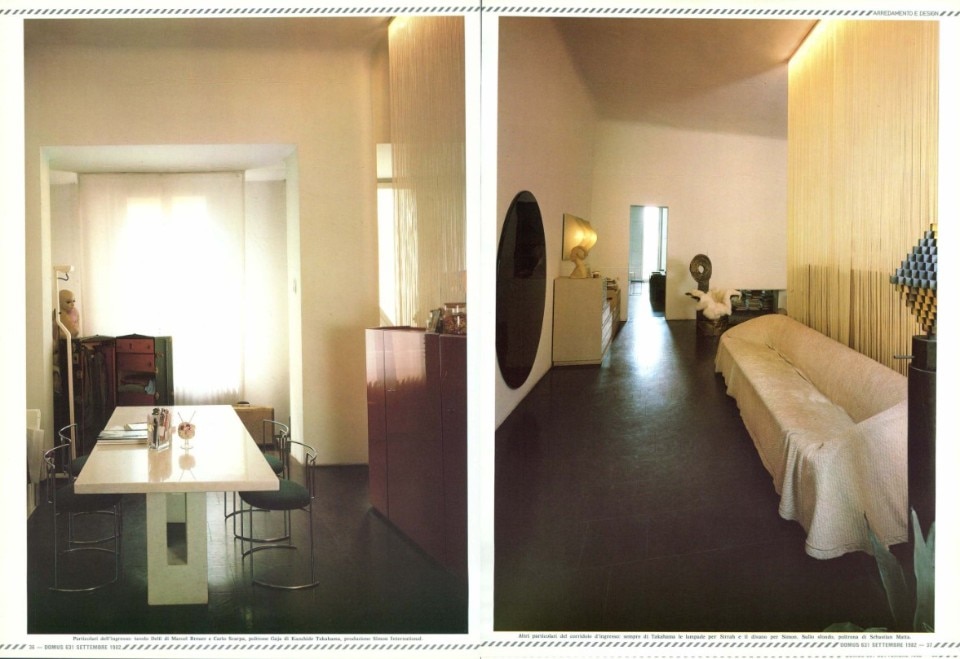
What impression have you got of Italian design abroad?
An important name without greatly deserving it. No, perhaps we do deserve it: going round the world it's difficult to find anyone who can make things like us. Here in Italy, the occasional small firm like my own has managed to get something done, even if we’ve done no more than point a way. I 've tried to do many things that might be pointers. And this is already something; what would be the good of working otherwise? You can’t eat more than twice a day; I’ve got a bicycle which I can ride to breathe clean air...
What is important for you, besides the bicycle?
Breathing.
If you had to change city, which would you choose?
If it hadn’t been destroyed by the terrifying wave of building over the last few years, I would have liked very much to live in Naples. For those who know how to appreciate it, Naples is an extremely cultured and civilized environment.
What do you like about Naples?
The people, how they move, how they talk, how they tell you about things, I could tell you wonderful things about Naples until tomorrow morning. But at the moment the situation there is dramatic.
And what do you think about the East?
I think of the traditional East, now unfortunately Westernized. It should have been us to follow them, not viceversa. The Japanese have an extraordinary sense of culture and seriousness. I am personally not very interested in technology. I’m more attached to things that are apparently less important.
I don’t feel I’m exercising my trade when I'm working and I seem to be doing it when I’m not working.
Dino Gavina
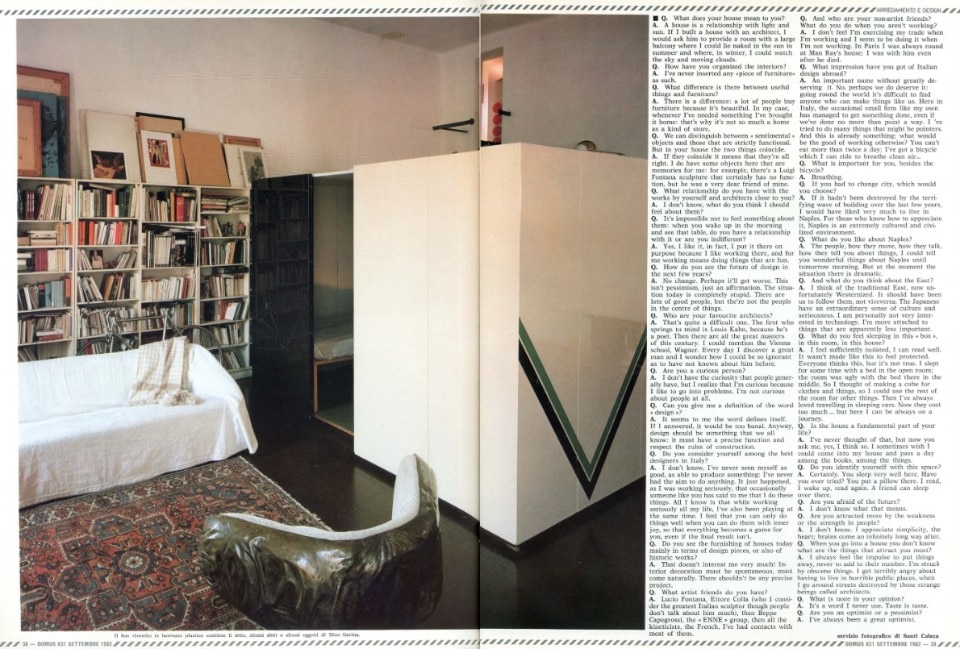
What do you feel sleeping in this « box », in this room, in this house?
I feel sufficiently isolated, I can read well. It wasn’t made like this to feel protected. Everyone thinks this, but it's not true. I slept for some time with a bed in the open room; the room was ugly with the bed there in the middle. So I thought of making a cube for clothes and things, so I could use the rest of the room for other things. Then I’ve always loved travelling in sleeping cars. Now they cost too much... but here I can be always on a journey.
Is the house a fundamental part of your life?
I’ve never thought of that, but now you ask me, yes, I think so. I sometimes wish I could come into my house and pass a day among the books, among the things.
Do you identify yourself with this space?
Certainly. You sleep very well here. Have you ever tried? You put a pillow there. I read, I wake up, read again. A friend can sleep over there.
Are you afraid of the future?
I don’t know what that means.
Are you attracted more by the weakness or the strength in people?
I don't know. I appreciate simplicity, the heart; brains come an infinitely long way after.
When you go into a house you don’t know what are the things that attract you most?
I always feel the impulse to put things away, never to add to their number. I’m struck by obscene things. I get terribly angry about having to live in horrible public places, when I go around streets destroyed by those strange beings called architects.
What is taste in your opinion?
It’s a word I never use. Taste is taste.
Are you an optimist or a pessimist?
I've always been a great optimist.A. I've always been a great optimist.




